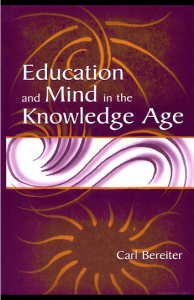Educational psychologist Carl Bereiter attempts to maintain a rational approach to knowledge formation while accounting for the diverse perspectives of learners.

More sophisticated concerns include the following: that “understanding,” as advocated by mainstream psychologists and science educators, is a particular kind of understanding favored by Western science—abstract, rational, contemptuous of traditional, commonsense knowledge; that an exclusively intellectual approach is being advocated, to the exclusion of feelings; and that individual cognitive styles and ways of learning are being swept aside in favor of purely verbal and logico-mathematical skills. All of these warrant extended discussion, but the main point here is that they can be discussed within a general commitment to teaching for understanding. …
That, said, however, I think educators must face up to the fact teaching for understanding is not culturally neutral. If it is to undertaken seriously and in the light of a modern conception of understanding, it is strong stuff. It is not about hatching baby chicks or showing off artifacts from your parents’ homeland—although such things may go on as part of an inquiry. It is about the relentless effort to improve on existing knowledge. That is not a culturally neutral idea. The advancement of knowledge is a modern notion and it goes against the grain of both premodern and postmodern beliefs. The idea comes easily to today’s students, because it is all around them in a culture where progress is the normal expectation. It doesn’t have to be taught. …
The likely effect of opening school doors to the pursuit of understanding is a decline in what I call large-D diversity, that is, diversity at the level of culturally distinct bodies of belief and ways of knowing. All schooling—indeed, any kind of inclusive social activity-tends to have this effect, and so it would be astonishing if teaching for understanding were an exception. The positive side is that, with students actively and cooperatively engaged in building an understanding of the world, there is an enlarged possibility for them to work out a relationship to conceptual artifacts that is compatible with their personal and cultural bents. This is one reason why it is useful for educators to think of knowledge as having this artifactual character rather than as things stowed in people’s minds. It makes it realistic to consider cultural and personal variations in ways of relating to the same objects. That seems to me a more promising way of dealing with diversity than the romantic way it is generally treated in schools, which has it that every culture houses its precious store of ideas that are sufficient unto that culture and should in no ways be meddled with. …
Large-D diversity is diversity defined over very large categories of gender, race (with this variable sometimes reduced to only two categories, people of color and the rest), ethnicity, the five senses (use categorize people according to their preferred sensory channel for learning), or the multiple intelligences (currently numbering seven or eight). These are important kinds of diversity, and for various reasons they are looming larger and larger in educational policymaking. At the same time, however, their significance in the actual business of the world—their economic significance, broadly defined—is declining. Furthermore, they tend to overshadow what I call small-d diversity, the economic significance of which is beginning to count as never before.
Bereiter, Carl. 2002. Education and Mind in the Knowledge Age. New York: Routledge. pp. 242-244. || Amazon || WorldCat
